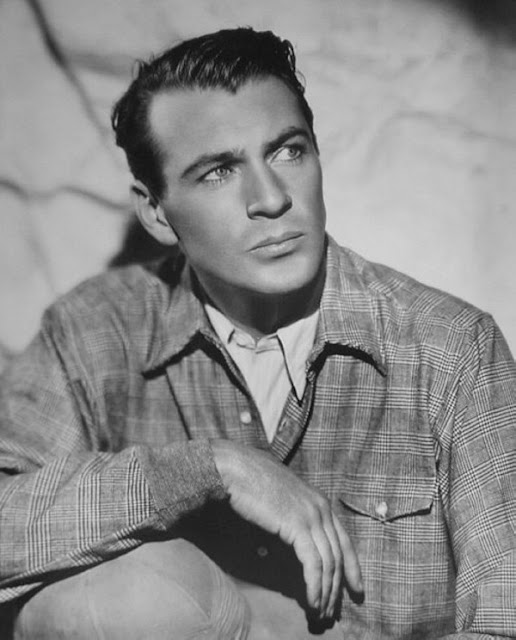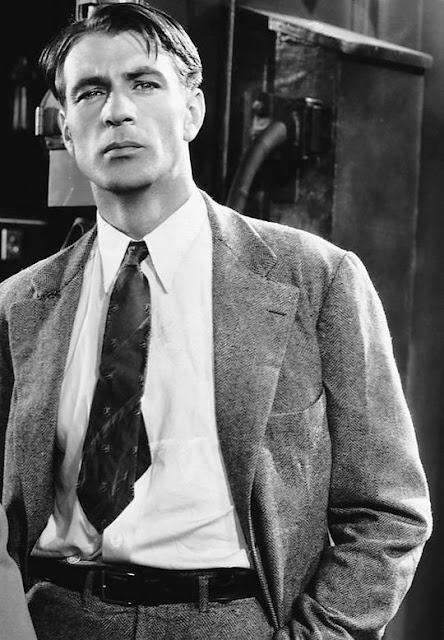Bisexual
American Screen Idol
1901-1961
For
three years during the late 1920s über-rich Howard Hughes maintained a sexual
relationship with a young, unknown but upcoming actor named Gary Cooper,
buying him cars, watches, clothes and other lavish gifts along the way. At the
time, Cooper, while playing only bit parts in silent films, was being supported financially
by handsome silent film actor Rod La Rocque, who refused to buy him a car.
Hughes to the rescue!
La
Rocque later entered into a marriage of convenience with Hungarian actress Vilma
Banky, who had strong lesbian tendencies, and during their marriage both La Rocque
and Banky continued to dally in same-sex relations. Freshly arrived from
Helena, Montana, Cooper was tall (6’3”), devastatingly handsome and possessed
of a legendary endowment, using his physical assets to acquire material goods
from older, much wealthier men and women. Hughes was also bisexual, also
well-endowed, and possessed of an obsession for bedding the most beautiful and
glamorous people, regardless of their sex. For Cooper (b. 1901), his
arrangement with Hughes was unusual in that Hughes (b. 1904) was actually a few
years younger than he.
At
the tender age of 26, Cooper’s two-minute appearance as Cadet White (above) in the silent
film masterpiece Wings (1927) became his breakthrough role, leading to
his career-making star turn in the talking film The Virginian (1929).
Hughes’s
attention span was notoriously short, however, and his infatuation with Cooper cooled
as he next set his sights on the dashing William Boyd, later known to millions
as Hopalong Cassidy. Boyd’s costar Louis Wolheim once mentioned that the
dazzlingly handsome Boyd, although basically heterosexual, wasn’t averse to
letting a man service him if he felt it would advance his career. On this point
Boyd and Cooper had a lot in common. Both Boyd and Cooper would attend the
all-nude male beach parties on Catalina Island hosted by bisexual actor Richard
Arlen, and a member of the Hollywood paparazzi once snapped a picture of the
naked Hughes and Boyd sharing an intimate kiss in a secluded cove on the island.
Hughes had to pay $10,000 to secure the negatives, thus preventing their publication.
The man had enough money to make trouble disappear. Serious money. He received $10,000 PER DAY from a trust fund.
Cooper photographed in 1932 by Cecil Beaton
Cooper had entered Hollywood as a hungry film extra in 1925. Later, on the cusp of stardom in 1929, Cooper met the Paramount contract actor Andy Lawler, a popular and flamboyant homosexual who became his closest friend. They even lived together until mid-1930. Lawler, born in Alabama, coached Cooper's southern accent for the film, The Virginian. He also introduced Cooper to a wider, more sophisticated social circle that included openly gay actor Billy Haines and gay director George Cukor, whom Lawler had followed out to Hollywood.
After Cooper became an American film icon, however, references to his relationships with Hughes and Lawler were whitewashed from his back story, a common practice by actors and actresses during the era dominated by the moral strictures of the 1930s Hays Code. Joan Crawford is a prime example. No more photos of Cooper and Lawler “out on the town” appeared in the press, and Cooper stopped attending Cukor’s notoriously gay social gatherings.
City Streets 1931
Most all of Cooper’s biographers mention the relationship between Lawler and Cooper, but few describe the relationship as sexual. At the most they report that aspect as “rumor”. However, E. J. Fleming, in his book The Fixers, accurately labeled Cooper “bisexual”. But the most reliable witness was William Kizer, Lawler’s cousin, who insisted that Gary Cooper was enmeshed in a serious relationship with Andy Lawler. They took cozy weekend trips and even moved in together in 1929/30, while Cooper was also dating the volatile Mexican actress Lupe Velez. “Volatile” is understatement; she once stabbed him and later fired a shot at Cooper as he was boarding a train in LA in 1931. Velez tolerated Cooper’s dalliances with men, so long as she could participate as well (!). Cooper confessed to Hughes that he had slept with both La Rocque and Velez.
Gary Cooper on Paramount Lot, 1933
According to Hollywood chronicler William J. Mann, Gary Cooper suffered a devastating breakdown after the studio-engineered split from Lawler. Nevertheless, after an initial distancing, Cooper and Lawler reunited as lifelong friends. Their special relationship is referenced in both Jeffrey Meyer's biography Gary Cooper: American Hero and Larry Sidwell's The Last Hero: A Biography of Gary Cooper.
Cooper's subsequent career as a major film star is well documented, so your blogger refers younger readers to his Wikipedia page, for starters.
Sources (other than those
mentioned above):
Patrick McGilligan -- George
Cukor: A Double Life (2013)
Darwin Porter – Howard Hughes:
Hell’s Angel (2005)
The following glamor shots, mostly from the 1930s, further reveal Cooper's legendary good looks, a far cry from his later somewhat weathered "lonesome cowboy" persona.
The following glamor shots, mostly from the 1930s, further reveal Cooper's legendary good looks, a far cry from his later somewhat weathered "lonesome cowboy" persona.















